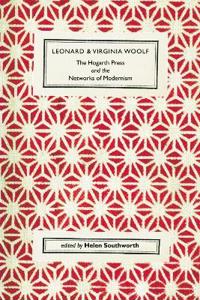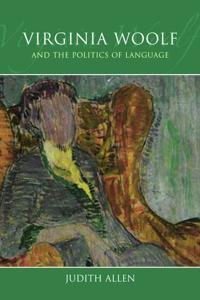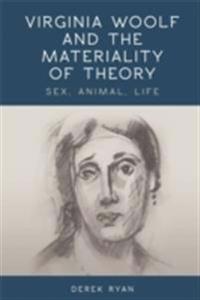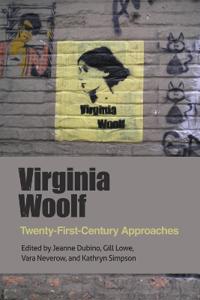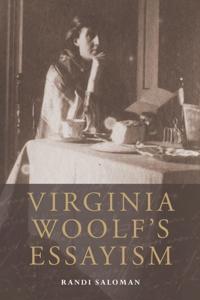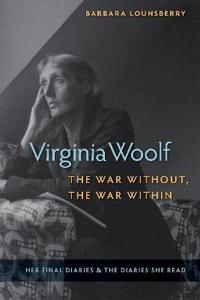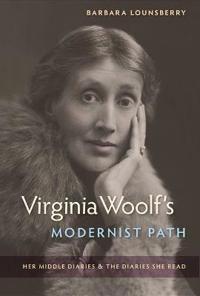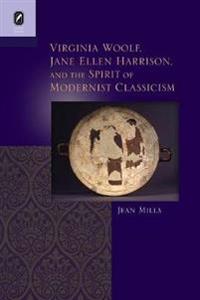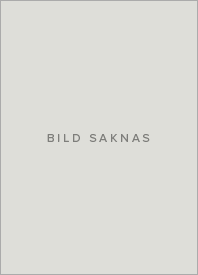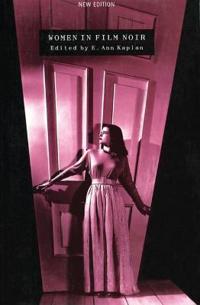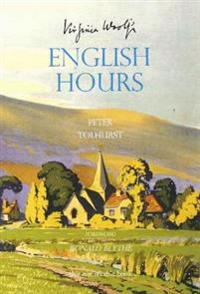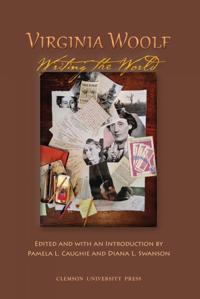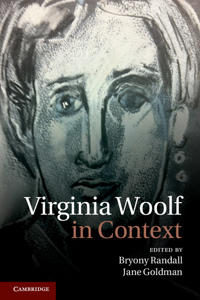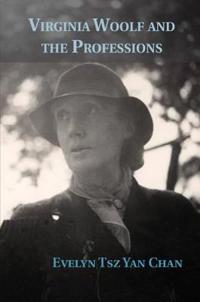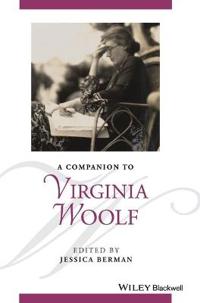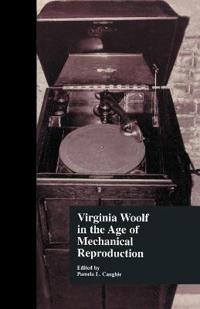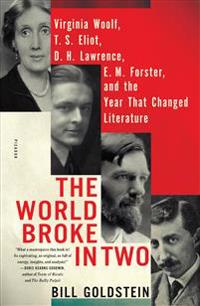Virginia Woolf & the Problem of the Subject (Pocket)
avMakiko Minow-pinkney
ISBN: 9780748641949 - UTGIVEN: 2011-03-01Leonard and Virginia Woolf, The Hogarth Press and the Networks of Modernism (häftad)
ISBN: 9780748647149 - UTGIVEN: 2012-04This multi-authored volume, newly available in paperback, focuses on Leonard and Virginia Woolf's Hogarth Press (1917-1941). Scholars from the UK and the US use previously unpublished archival materials and new methodological frameworks to explore the relationships forged by the Woolfs via the Press[...]
Virginia Woolf and the Politics of Language (Häftad)
avJudith Allen
ISBN: 9780748664856 - UTGIVEN: 201209In the context of today's significant struggles with 'fundamentalisms', media consolidation, and the stifling of dissent, Allen's close readings of Woolf's writings focus on their relevance to our current political situation. Judith Allen approaches Woolf as a theorist of language as well as a theor[...]
Virginia Woolf And The Materiality Of Theory (Inbunden)
avDerek Ryan
ISBN: 9780748676439 - UTGIVEN: 2013-04-30Derek Ryan demonstrates how materiality is theorised in Woolf's writings by focusing on the connections she makes between culture and nature, embodiment and environment, human and nonhuman, life and matter.[...]
Virginia Woolf and the Materiality of Theory: Sex, Animal, Life
ISBN: 9780748676446 - UTGIVEN: 2015-06Explores Woolf's writing alongside Deleuzian philosophy and new materialist theories of 'sex', 'animal', and 'life'' How does Virginia Woolf conceptualise the material world? In what ways has Woolf's modernism affected understandings of materiality, and what new perspectives does she offer contempo[...]
Virginia Woolf: Twenty-First-Century Approaches
ISBN: 9780748693931 - UTGIVEN: 2014-12These 11 newly commissioned essays represent the evolution, or coevolution, of Woolf studies in the early 21st-century. Divided into 5 parts - Self and Identity; Language and Translation; Culture and Commodification; Human, Animal, and Nonhuman; and Genders, Sexualities, and Multiplicities - the ess[...]
Virginia Woolf's Essayism (Häftad)
avRandi Saloman
ISBN: 9780748694105 - UTGIVEN: 2014-06This book explores the way Woolf used essay-writing techniques to develop her conception of the modern novel. The focus of this study is on Virginia Woolf's vast output of essays and their relation to her fiction. Randi Saloman shows that it was by employing tools and methods drawn from the essay ge[...]
Virginia Woolf, the War Without, the War Within
ISBN: 9780813056937 - UTGIVEN: 2018-07In her third and final volume on Virginia Woolf's diaries, Barbara Lounsberry reveals new insights about the courageous last years of the modernist writer's life, from 1929 until Woolf's suicide in 1941. Woolf turned more to her diary-and to the diaries of others-for support in these years as she en[...]
Virginia Woolf's Modernist Path
ISBN: 9780813062952 - UTGIVEN: 2016-11In this second volume of her acclaimed study of Virginia Woolf's multivolume diary, Barbara Lounsberry traces the English writer's life through the thirteen diaries she kept from 1918 to 1929. During these interwar years, Woolf began penning many of her most famous works, including Mrs. Dalloway, To[...]
Virginia Woolf, Jane Ellen Harrison, and the Spirit of Modernist Classicism
ISBN: 9780814252987 - UTGIVEN: 2016-06Bedside, Bathtub And Armchair Companion To Virginia Woolf And Bloomsbury (Pocket)
avSarah M. Hall
ISBN: 9780826486752 - UTGIVEN: 2007-10-31Virginia Woolf was one of the most important writers of the twentieth century. Her involvement in the lively and controversial Bloomsbury Group was a significant part of both her personal and creative lives. This book explores Woolf's early life and family, the origins and activities of the Bloomsbu[...]
Virginia Woolf
ISBN: 9780826494436 - UTGIVEN: 2007-03Holtby gives us Woolf the critic, the essayist and the experimental novelist in a critical memoir which is of particular interest as the work of one intelligent, though very different, novelist commenting on another. Holtby's careful reading of Woolf's work is set in the context of the debate betwee[...]
Women in Film Noir (Häftad)
avVirginia Woolf
ISBN: 9780851706665 - UTGIVEN: 199809The first edition of "Women in Film Noir" (1978) assembled a group of scholars and critics committed to understanding the cinema in terms of gender, sexuality, politics, psychoanalysis and semiotics. This edition is expanded to include further essays which reflect the renewed interest in Film Noir. [...]
Virginia Woolf and Trauma: Embodied Texts (Häftad)
avSuzette Henke, David Eberly
ISBN: 9780944473795 - UTGIVEN: 2007-03Virginia Woolf in Context (Inbunden)
ISBN: 9781107003613 - UTGIVEN: 201212As a paradigmatic modernist author, Virginia Woolf is celebrated for the ways her fiction illuminates modern and contemporary life. Woolf scholars have long debated how context - whether historical, cultural, or theoretical - is to be understood in relation to her work and how her work produces new [...]
Virginia Woolf and the Professions (Inbunden)
avEvelyn Chan
ISBN: 9781107070240 - UTGIVEN: 2014-07This book explores Virginia Woolf's engagement with the professions in her life and writing. Woolf underscored the significance of the professions to society, such as the opportunity they provided for a decent income and the usefulness of professional accreditation. However, she also resisted their [...]
A Room of One's Own (Häftad)
avVirginia Woolf, David Bradshaw, Stuart N. Clarke
ISBN: 9781118298763 - UTGIVEN: 2015-02-28A Companion to Virginia Woolf
ISBN: 9781118457887 - UTGIVEN: 2016-03A Companion to Virginia Woolf is a thorough examination of her life, work, and multiple contexts in 33 essays written by leading scholars in the field.Contains insightful and provocative new scholarship and sketches out new directions for future researchApproaches Woolf's writing from a variety of p[...]
Virginia Woolf in the Age of Mechanical Reproduction
ISBN: 9781138986770 - UTGIVEN: 2015-12First Published in 2000. Routledge is an imprint of Taylor & Francis, an informa company.
The World Broke in Two: Virginia Woolf, T. S. Eliot, D. H. Lawrence, E. M. Forster, and the Year That Changed Literature (häftad)
ISBN: 9781250182500 - UTGIVEN: 2018-08A revelatory narrative of the intersecting lives and works of revered authors Virginia Woolf, T. S. Eliot, E. M. Forster and D. H. Lawrence during 1922, the birth year of modernismThe World Broke in Two tells the fascinating story of the intellectual and personal journeys four legendary writers, Vir[...]
Virginia Woolf
ISBN: 9781316606834 - UTGIVEN: 2016-04E. M. Forster and Virginia Woolf were members of the Bloomsbury Group and key literary figures at the forefront of an artistic movement known as Modernism in the early twentieth century, a movement which for English literature meant the innovative re-shaping of boundaries in form, narrative and lang[...]


